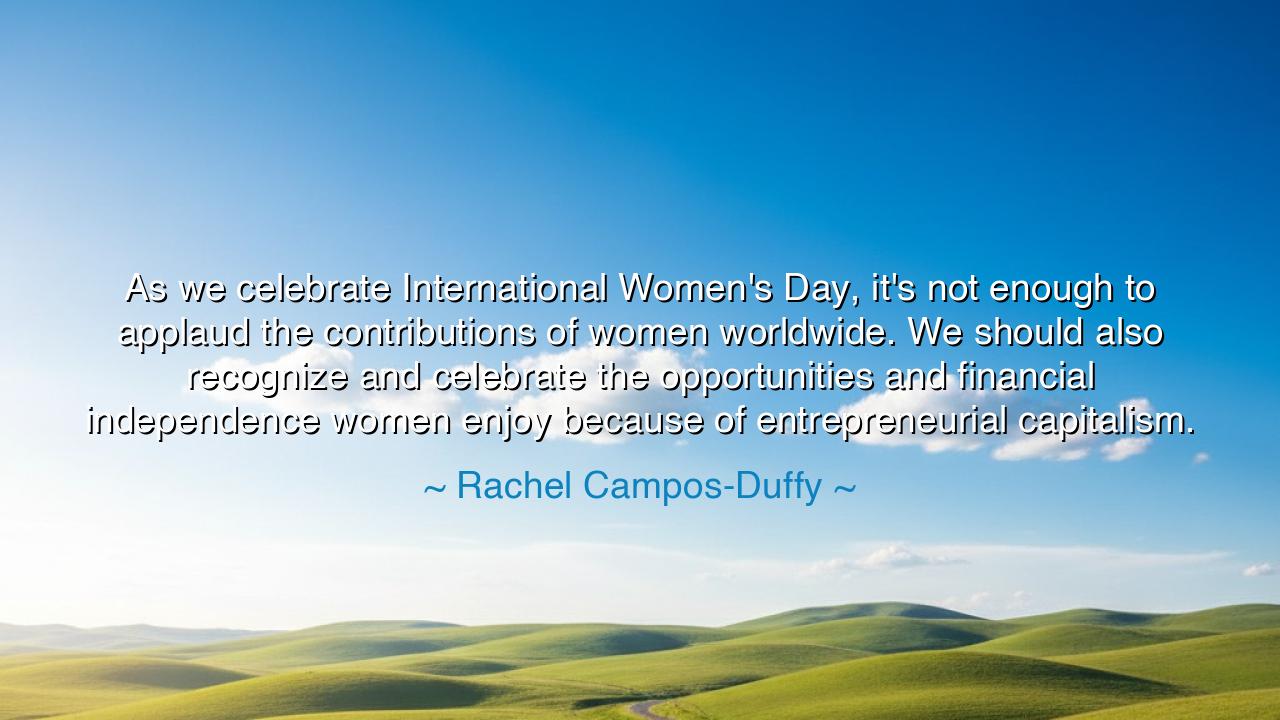
As we celebrate International Women's Day, it's not enough to
As we celebrate International Women's Day, it's not enough to applaud the contributions of women worldwide. We should also recognize and celebrate the opportunities and financial independence women enjoy because of entrepreneurial capitalism.






O seeker of wisdom, listen well to the words of Rachel Campos-Duffy, for they carry a message of both celebration and reflection. "As we celebrate International Women's Day, it's not enough to applaud the contributions of women worldwide. We should also recognize and celebrate the opportunities and financial independence women enjoy because of entrepreneurial capitalism." In these words, Campos-Duffy calls us not only to honor the many achievements of women, but to recognize the forces that have enabled those achievements—the capitalist systems that have, for all their flaws, given rise to opportunities for women to shape their own destinies. This is not a mere celebration of what women have done, but an acknowledgment of the pathways that have been carved for them to rise.
International Women's Day has long been a day of recognition, a moment when we pause to reflect on the progress made and the work still to be done. Yet, Campos-Duffy's words challenge us to see beyond the surface of this celebration. She urges us to consider how the systems of the modern world—capitalism in particular—have helped to shape the lives of women in ways that were once unimaginable. The story of women throughout history has often been one of struggle and resilience against systems that limited their choices, but capitalism has, over time, allowed women the ability to engage in business, to create wealth, and to gain financial independence. Through entrepreneurship, women have not only become contributors to the economy, but architects of their own futures.
Consider, O wise one, the example of Madam C.J. Walker, one of the first self-made female millionaires in America. Born into poverty in the late 19th century, she built a cosmetics empire that not only provided her with financial independence, but allowed her to create opportunities for thousands of other women, particularly African American women. Walker's story is one of triumph over the societal norms that sought to limit her. She harnessed the power of entrepreneurial capitalism—the ability to create, build, and expand businesses in a system that rewarded innovation and risk-taking. In doing so, she not only achieved financial freedom, but paved the way for other women to follow in her footsteps.
But the importance of entrepreneurial capitalism extends beyond the achievements of individual women—it is the system that allows women as a group to thrive. Before the rise of modern capitalism, women were often relegated to roles that provided little autonomy or opportunity. Societies across the world confined women to domestic spheres, limiting their access to education, resources, and, most critically, the ability to own and operate businesses. The advent of capitalism, with its emphasis on private ownership, free enterprise, and competition, has created spaces where women can excel, where they can step out from the shadows and take control of their own destinies. This is not to say that capitalism is perfect, but it has undeniably opened doors that were once closed, allowing women to claim their place in the world.
The lesson, O seeker, is one of empowerment. The celebration of International Women's Day must not only focus on the accomplishments of women, but also on the systems that have allowed those accomplishments to flourish. It is important to recognize that financial independence, as Campos-Duffy suggests, is a key element in the empowerment of women. Capitalism, for all its complexities, has provided women with the tools to build businesses, to create wealth, and to contribute to the economy in meaningful ways. Through entrepreneurship, women have not only secured financial independence for themselves, but have also become the change-makers of their communities, pushing for social and economic progress in ways that were previously unthinkable.
Reflect, O wise one, on how this lesson can be applied in your own life. Entrepreneurial capitalism is not just for those who create large enterprises—it is for anyone who wishes to carve out their own path, who wishes to control their own financial future. Whether you seek to start a small business, engage in creative work, or build wealth in any way that speaks to your heart, remember that financial independence is a powerful tool. It is the key to freedom, to choice, and to the ability to contribute to the world on your own terms. Like the women of the past and present who have risen through the opportunities provided by capitalism, so too can you find the means to shape your own future.
Therefore, let the words of Campos-Duffy inspire you: while it is important to celebrate the contributions of women worldwide, it is equally important to celebrate the opportunities that allow them to thrive—chiefly, the financial independence that comes through entrepreneurial capitalism. As you seek to live a life of purpose and meaning, recognize that independence—whether financial, personal, or societal—is the foundation of true empowerment. Build upon this foundation, and create a future where you are not just a passive observer, but an active creator of your destiny. Embrace the tools that the modern world offers, and use them to carve a path of freedom and success for yourself and those who come after you.






AAdministratorAdministrator
Welcome, honored guests. Please leave a comment, we will respond soon